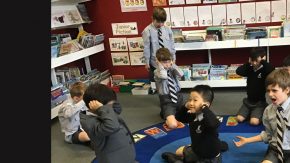Faith Matters
“Your grandmother knits a jumper for you for Christmas. It’s ugly and it’s uncomfortable. When she asks what you think of it, you tell her it’s really nice. Is this lying?”
“Is ‘sledging’ in cricket cheating?”
“You have been waiting in the line at the canteen. People are behind you. A friend comes up and ask you to buy them a meat pie. Has your friend ‘pushed in’ on the queue? Do you buy them a meat pie?”
“Should children not have to do any housework at all? Why?”
“What if your school taught using only videos and YouTube? Would this be better or worse than reading? Why?“
“What are the best and most exciting futures? What are the worst and most scary futures?”
These are just some of the ethical dilemmas and big ideas that Year 6 has been looking at in RE classes this term. The purpose of this Unit has been to encourage the boys to think a bit deeper, to question and challenge what they understand and to debate different perspectives.
When we think about Ethics we see that it pervades almost all parts of our life. Ethical questions can be as simple as ‘do I let this person merge in front of me on the road’ or as complicated as ‘is war ever justified’. Yet, all too often when we start thinking about ethics we often go to the most complex, difficult questions and forget that ethical questions are part of our everyday lives.
I admit that it’s the everyday ethical questions that I, and I’m sure most others, struggle with. If I’m rushing to get somewhere and I’m stuck in traffic why should I let someone else merge in front of me? In that moment of decision I can think of a multitude of different reasons not to let that person’s car in front; they’re trying to get ahead, they intentionally got in the wrong lane, they’ll hold me up even further etc etc. Yet when I really think about it, what difference does one car in front of me make? But that process is a simple process of ethical reasoning that we go through almost every day.
I think it’s important to encourage our young people to explore these ethical questions too. Some of the questions that we’ve looked at in Year 6 are bigger picture ideas ‘imagine what the future in 1000 years might look like’. But others are really simple like ‘is it OK to buy a meat pie at the canteen for a friend who’s cutting in?’. It’s those arguably smaller ethical dilemmas that I believe can be the most important for our young people. It’s a process of encouraging them to think about their actions and the way they live and how that might impact those around them.
Simple ethical questions can be started when we’re sitting together watching a sporting match and a challenge to a referee’s decision comes up or when we’re reflecting with children on what they did at school. It’s always important to encourage the conversations, to challenge their thinking at an age appropriate level and to encourage them to think deeply about their actions and the world around them.
All of us want to be the most ethical people that we can, and essentially that’s what we want from our young people to. So because of that, it’s important that we encourage them to think deeply about ethical dilemmas that impact on their lives.
Grace and peace,
Pastor Richard La’Brooy






